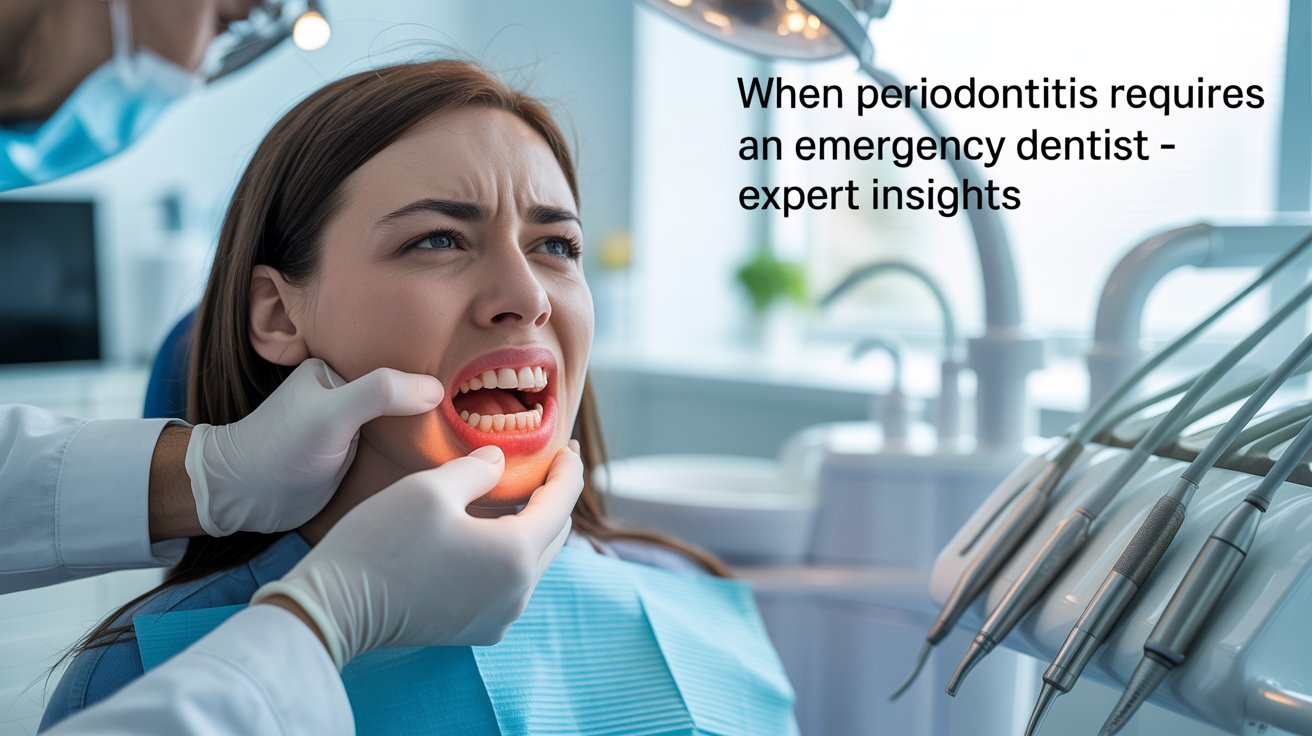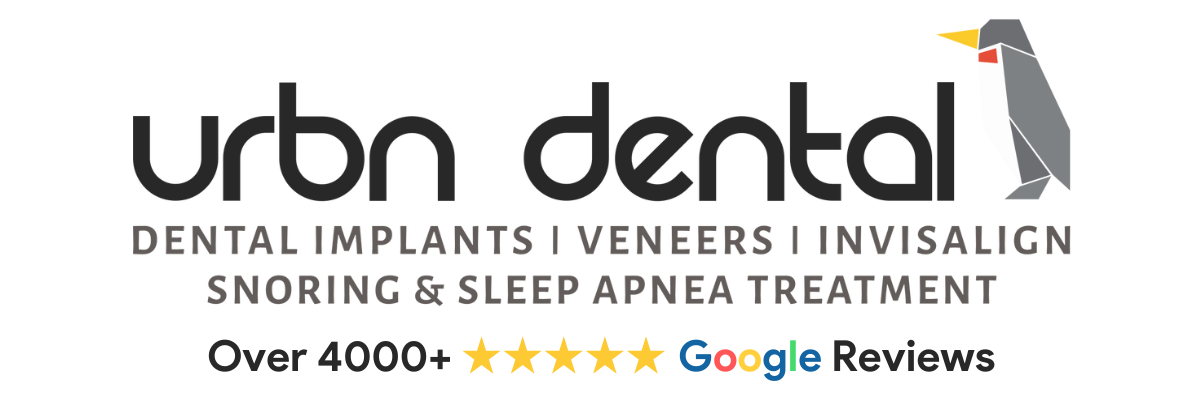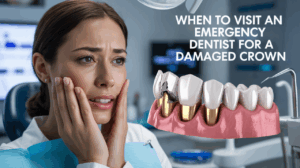
Periodontitis is a progressive gum disease that, if left untreated, can lead to tooth loss, changes in the supporting bone, and has also been linked with certain systemic health conditions. While many people associate a dental emergency with a sudden injury, gum infections can sometimes become serious and may require prompt dental evaluation.
If symptoms such as severe pain, swelling, abscesses, or loose teeth occur, it’s important to seek a professional assessment. But when exactly does gum disease turn into a situation that needs urgent care? And what should you do if you notice symptoms getting worse?
In this article, we’ll explore how periodontitis can progress into a dental concern that may need urgent attention, and what our trusted emergency dentist in Houston may recommend for managing advanced gum infections.
Understanding Periodontitis and Its Progression
Gum disease refers to conditions that affect the tissues supporting your teeth. Periodontitis is the more advanced stage, beginning when the gums and supporting bone start to deteriorate. It often develops from gingivitis (inflamed gums) if oral hygiene and professional dental care are neglected.
As the condition progresses, gum tissue may recede from the teeth, creating pockets where bacteria and plaque can collect. This can lead to inflammation, infection, and possible bone damage beneath the gum line.
Warning signs that periodontitis may be worsening include:
- Persistent bad breath or unpleasant taste
- Red, swollen, or bleeding gums
- Gum recession and deeper periodontal pockets
- Pus between the gums and teeth
- Loose or shifting teeth
- Pain in the gums or jaw
If these symptoms suddenly worsen, it may be considered a periodontal concern that requires timely evaluation. Our dentist can assess your condition and recommend appropriate next steps.
If you’re worried about these symptoms, consider contacting our Houston dental office to ask about appointment availability.
When Periodontitis May Be Considered Urgent
Not all gum issues require emergency care, but there are certain situations where you may require evaluation in case of periodontitis emergency:
Severe Pain Affecting Daily Life
If gum or jaw pain becomes severe, interfering with eating, resting, or speaking, it may be time to schedule a dental visit for urgent evaluation.
Rapid Swelling or Abscess Formation
A dental abscess often develops from bacterial infection. Without care, the infection may spread to surrounding tissues and, in rare cases, could affect overall health. Prompt evaluation by an emergency dentist Houston is generally recommended if an abscess is suspected.
Heavy or Persistent Bleeding
While mild bleeding after brushing may not be unusual, sudden or heavy bleeding, especially with swelling or pain, should be checked quickly.
Loose or Shifting Teeth
Movement in teeth may signal advanced gum disease. Our dentist can examine your situation and explain treatment options.
Why Timely Gum Infection Treatment Matters
Severe gum infections may affect both oral and overall health, which is why early evaluation is often recommended. Postponing care can sometimes increase the risk of complications.
Seeking care for gum infections in Houston may help with:
- Preserving teeth and supporting bone
- Reducing the risk of infection spreading
- Lowering the chances of systemic complications (such as those linked to diabetes or cardiovascular conditions)
- Relieving pain and improving quality of life
Our dentist will need to examine your case in person to determine the most suitable gum infection treatment in Houston. Outcomes vary depending on each patient’s condition.
What To Expect From Urgent Periodontal Care
Treatment will depend on how advanced the gum infection is. Common approaches an emergency dentist in Houston may consider include:
- Scaling and Root Planing: Deep cleaning below the gum line to remove plaque and tartar, encouraging healing.
- Antibiotic Therapy: Oral or topical antibiotics may be used to help control infection. Also, you can search for a dental specialist near me and book an appointment with an expert dentist.
- Abscess Drainage: If an abscess is present, draining it can relieve pain and reduce infection risk.
- Surgical Procedures: In advanced cases, options may include flap surgery, bone grafting, or tissue regeneration techniques.
- Tooth Extraction: If a tooth cannot be preserved, extraction may be recommended. Replacement options, such as implants or bridges, can then be discussed.
How to Reduce the Risk of Periodontal Emergencies
While advanced gum disease can progress quickly, prevention is possible with consistent oral care habits and regular dental checkups. Steps to help protect your gums include:
- Brushing twice daily with fluoride toothpaste and cleaning between teeth
- Avoiding tobacco, which increases gum disease risk
- Scheduling professional cleanings and exams at least twice a year
- Managing health conditions like diabetes, which can heighten susceptibility
- Paying attention to early gum symptoms and seeking care promptly
Bottom Line
Prompt evaluation is key to preventing gum disease from becoming more complex. If you experience sudden gum pain, swelling, heavy bleeding, or tooth mobility in Houston, consider scheduling an appointment with a dentist for an evaluation of your symptoms.
Our Houston dental team is committed to providing supportive, patient-centered care. The gum inspection treatment in Houston recommendations will depend on your individual case and needs.
Disclaimer: This article is for educational purposes only and does not replace professional diagnosis. A dentist will need to examine you in person to determine the most appropriate treatment. Results might vary for each patient.
FAQs
What is periodontitis, and can it cause tooth loss?
Periodontitis is an advanced form of gum disease that can damage the supporting bone around teeth. In severe, untreated cases, teeth may loosen or be lost. Professional treatment may help reduce this risk.
How fast can a gum infection spread?
Progression depends on each patient’s health and condition. Without care, gum infections may worsen and spread to nearby tissues. Early treatment is usually recommended.
Can I go to the ER for a gum infection?
Hospitals may provide temporary relief (such as antibiotics or pain management), but most do not have dental specialists available. Seeing a dentist is the best option for long-term care.
What is the best treatment for a gum infection in an emergency?
Treatment depends on severity. Options may include deep cleaning, antibiotics, drainage of an abscess, or surgery. An emergency dentist in Houston will examine you and recommend what’s appropriate.




